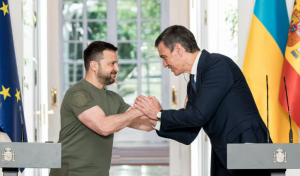Spain will provide Ukraine with €1bn in military aid this year after the Spanish prime minister, Pedro Sánchez, and Ukraine’s president, Volodymyr Zelenskiy, met in Madrid to sign an “enormously important”, decade-long defence and security deal.
Although the precise details of the agreement have not been made public, the Spanish government said its assistance would “allow Ukraine to prioritise its capacities, including its air defences”.
The bilateral deal was agreed two days after Russia’s onslaught in the north-eastern Ukrainian city of Kharkiv killed 18 people, and as EU leaders grow increasingly exasperated with Hungary’s efforts to block aid to Ukraine.
Russia-Ukraine war: EU ministers fail to pledge Patriot systems to Ukraine at key meeting – as it happened
Read more
“[This deal] will allow Ukraine to boost its capabilities, including its essential air defence systems to protect its civilians, cities and infrastructure, which are still suffering indiscriminate attacks as seen this weekend in Kharkiv,” Sánchez told a press conference after the signing.
He said Spain had already pledged to supply Patriot missiles and said it would also send “another batch of Leopard tanks and above all ammunition”.
The Spanish government said the agreement would also include other areas, such as intelligence, training, de-mining, reconstruction and humanitarian assistance.
Zelenskiy, who recently issued a desperate plea for world leaders to attend a “peace summit” next month in Switzerland, said he had briefed Sánchez on the situation on the frontline and was grateful to Spain for its “tangible and truly life-saving support”.
But he said Ukraine still urgently needed another seven US-made Patriot air defence systems to stop Russia using Soviet-era glide bombs to hit the power grid and civilian areas.
Glide bombs are heavy bombs fitted with precision guidance systems and launched from aircraft flying out of range of air defences. The bombs weigh more than a tonne and completely destroy their targets, leaving a huge crater.
Oleh Syniehubov, the governor of Kharkiv oblast, said a Russian attack on Monday had killed one person and injured 10 others.
“The enemy attacked a civilian enterprise with a guided bomb,” he said. “There is damage to production facilities.”
It also emerged on Monday that about €6.5bn (£5.5bn) in EU military aid for Ukraine is being held up by Hungary.
Russia-Ukraine war: EU needs to find way around Hungary obstructing support for Ukraine, says Lithuania – as it happened
Read more
Sources at an EU summit of foreign ministers said Hungary’s prime minister, Viktor Orbán, is trying to stop a new fund of €5bn that was agreed in March, even though the country had an opt-out from the fund. The funds have already been allocated but Hungary is blocking the instruments for their disbursement, as well as three tranches of €500m each. Hungary’s obstruction is increasing frustration among other EU member states who see winning the war in Ukraine as an existential issue.
Lithuania’s foreign minister, Gabrielius Landsbergis, told reporters in Brussels that analysis showed Hungary had blocked nearly half of all declarations on Ukraine since Russia invaded in 2022.
“I think we have to be transparent as to what Hungary’s position currently is,” he said. “We looked into this and about 41% of resolutions by the EU on Ukraine have been blocked by Hungary. The European Peace Facility (EPF) is blocked … Ukrainian accession talks are being held hostage by Hungary.”
Landsbergis added: “I could go on and on – the declaration on Georgia, Armenia. So basically, almost all of our discussions, needed solutions and decisions by the EU are being blocked by just one country.”
He also said he believed a mechanism that would allow the EU to remove Hungary’s ability to vote on bloc-wide foreign policy decisions was not a viable option because it requires unanimity.
“We have to convince the countries in the 26 [other member states], that the actions of one [member state] hinder all our ability to act to do what is required,” he said.
Micheál Martin, Ireland’s deputy prime minister, said there had been “a robust discussion” about unlocking the European peace facility because of the pressure Ukraine is under.
“There was quite a significant exchange and people are very anxious to do everything we possibly can,” Martin added.
The Guardian

